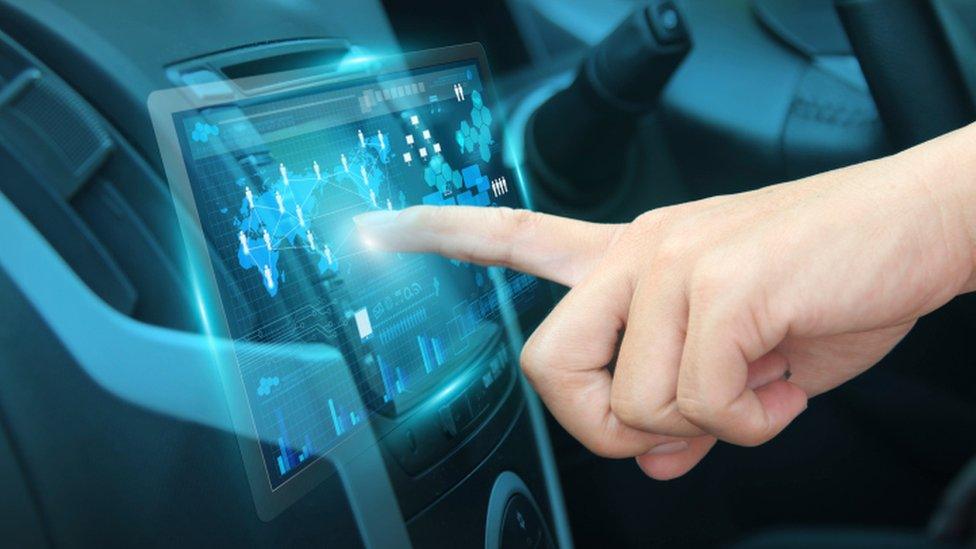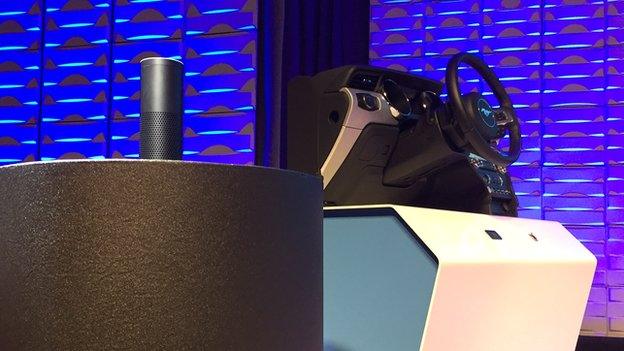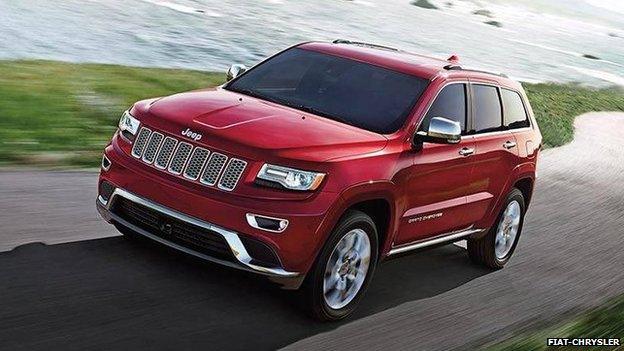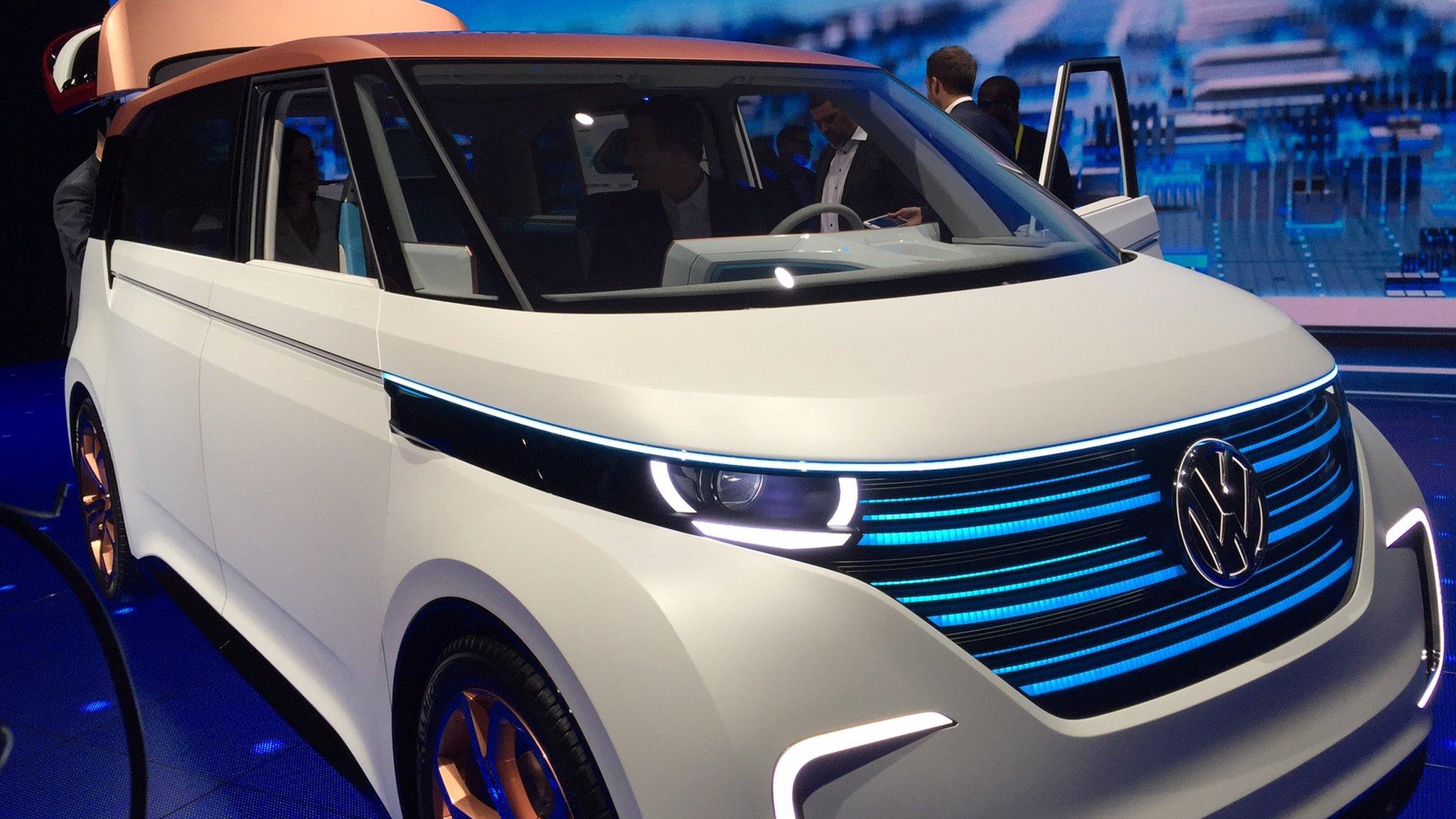Commuting by connected car
- Published

Imagine a different type of morning commute. You start the car from the kitchen, setting the temperature to match the one in your home.
You're on the school run, with the kids in the back seat. They're using the car's wifi hotspot, linked to your home broadband contract, to game with their friends in other cars.
Concerned that you forgot to turn down the heating at home, you engage "away mode", and several of your household appliances are remotely switched off.
Your mind is already in the office, because there's a screen on the dashboard which lets you hear and answer emails, as well as schedule meetings.
One of your emails includes a photograph your car took yesterday. It was parked (an app had found the space, and paid for it), and while you were away, it was shunted by another car, setting off an automatic photograph of the offending shunter, with the snap sent on to you.
Dashboard display
A collision on your route means there's congestion. Perhaps another driver was distracted by unexpected news in one of those emails.
From your dashboard display, a voice informs you about the snarl-up, and offers an alternative route.
Using data from other road users, you know how long that will take in current traffic conditions. So you re-schedule the first meeting.

Then there's another message. It's from your breakdown service. Instead of waiting for you to tell it that you're stranded, the service now means it tells you when things are about to go wrong.
The call is to warn you that the car's diagnostics have just flashed up a warning at its contact centre. You need to pull over within five miles.
"I'm hungry," you say. The onboard computer responds by giving you a choice of nearby restaurants serving breakfast. You choose one, and its location is sent to the breakdown service, which will send a crew to meet you in the restaurant car park.
That first meeting of the day has to be re-arranged again, so you have it by video-conference from the driver's seat.
Gadget and gizmo
Your commute is in the connected car - partly of the future, but much of which is already available.
Many new cars come with a telecom link that contacts emergency services if you break down or you're in an accident. There are elements of this you can already do using standard mobile phones and tablets.
But the drive is on to make the car into its own mobile telecom device. This is just the start of part of the automotive industry that's relatively small but growing fast.
In Las Vegas this week, the gadget and gizmo extravaganza at the Consumer Electronics Show has included a number of innovations, plans and collaborations between car manufacturers and software developers.

The Consumer Electronics Show featured collaborations between car makers and tech firms, such as the Amazon Echo system
Computing power is already a partner of the brake horse variety. In a recent report, McKinsey consultants pointed out that the average car has the processing power of 20 personal computers, along with 100 million lines of computer code.
Its survey of car buyers in the US, China, Germany and Brazil found an interesting challenge for car manufacturers. People expect their car to be connected. Indeed, some see the electronics as more important than engine power and fuel efficiency.
But they're not willing to pay much extra for those features. And they don't like the risks of the car being hacked, or the loss of privacy about their driving habits or whereabouts.
Your car could be sending out real-time information not only on your location but on your speed. And all this would make it much easier to introduce road pricing, where tax is levied on which roads you use and at what times.
Hacked jeep
The hacking risk became real in America last July, when it was first reported that a Jeep Cherokee had been remotely sabotaged. Such a move makes it possible to take control of a car remotely. (Expect to see such a plot line in the next Bond movie.)
Fiat Chrysler, which makes Jeeps, duly recalled 1.4 million vehicles for a software upgrade - something that could surely be done remotely in connected cars, though that would tend to emphasise the risk.
The AA breakdown service has been campaigning about the risk of data being compromised. But this week, it also embraced the telecom technology, announcing a joint venture which should see it contacting members when their car's diagnostics throw up warning signs.

The Jeep Grand Cherokee was among vehicles recalled for a software upgrade by Fiat Chrysler
There is, meanwhile, an immense amount of effort going into developing the car which isn't remotely controlled, but which drives itself autonomously.
That means a whole lot more electronics, and comes with consideration of what people in such a car could do with their time. The mobile office becomes much more than a driver's distraction, and that time becomes productive.
It also ties in with moves towards a sharing economy, in which cars are commonly owned, or are rented.
Bumper sales
And that future insight gives a bit of perspective to the stock-taking this week of the UK automotive industry.
Looking back on 2015, there were bumper sales, with more than 2.63 million new cars registered in the UK, up 6% on 2014. That's been driven by cheap and flexible finance, combined with growing consumer confidence.
But the energy sector downturn in the Grampian region is being blamed for putting Scottish sales into reverse. New car registrations were down just over 1,000 on 2014, at 220,000. Just over half of these were private, as opposed to business and fleet cars.
Not that the economic slowdown is all about austerity and cutbacks for everyone. The Society of Motor Manufacturers and Traders reported new registrations in Scotland last year of 20 Rolls-Royces, 20 Lamborghini, 28 Ferrari, 57 Bentleys, 84 Maserati and nine custom-built Morgans.
Van man
The SMMT emphasises this is a very significant sector, with turnover of nearly £70bn, value added of £15.5bn and 800,000 jobs.
And it's not all about cars. The stock-take of 2015 registrations also points to buses and coaches heading back towards the peaks reached before the financial crunch.
Buses were up 23%, and double-deckers up 35%. Bus builder Alexander Dennis of Falkirk is in the driving seat, with orders for the bigger buses.
Truck sales picked up significantly after a regulatory change in 2014 saw a big dip. And all that online shopping is doing great things for new van registrations - up 16% to 372,000 across the UK.
That may also be short-lived if these gizmo guys have their way. While we're commuting in self-driving cars, the shopping may be getting delivered by drone.
- Published6 January 2016
